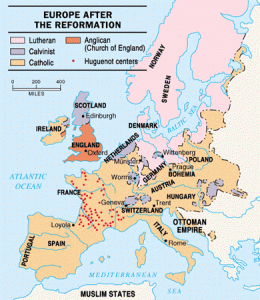 I am not alone in considering the Protestant Reformation the greatest move of God in Church history (outside of the New Testament), yet it came with a great price. It was not uncommon for precious saints to be rounded up and burnt at the stake, as Roman Catholic authorities sought to prevent the spread of the gospel.
I am not alone in considering the Protestant Reformation the greatest move of God in Church history (outside of the New Testament), yet it came with a great price. It was not uncommon for precious saints to be rounded up and burnt at the stake, as Roman Catholic authorities sought to prevent the spread of the gospel.
On such occassions, as men and women were marched through the streets and facing certain death in the flames, sympathizers in the crowd would shout out words of courage. An oft repeated refrain was “Sing the 46th!” – a reference to Martin Luther’s hymn “A Mighty Fortress” which was based on Psalm 46. It became the battle cry of the Reformation. For many saints of God now in their heavenly rest, the words of this hymn were their last recorded words on earth.
Unlike the very superfical songs which fill the landscape of the visible Church in our day, this is a hymn with depth and passion, inspiring courage to stand for the truth of God in a day of much milktoast, politically correct, spineless Christianity. As many of our departed saints would no doubt testify, this, in contrast, is a hymn to die to.
A MIGHTY FORTRESS IS OUR GOD
1. A mighty fortress is our God,
a bulwark never failing;
our helper he amid the flood
of mortal ills prevaling.
For still our ancient foe
doth seek to work us woe;
his craft and power are great,
and armed with cruel hate,
on earth is not his equal.
2. Did we in our own strength confide,
our striving would be losing,
were not the right man on our side,
the man of God’s own choosing.
Dost ask who that may be?
Christ Jesus, it is he;
Lord Sabaoth, his name,
from age to age the same,
and he must win the battle.
3. And though this world, with devils filled,
should threaten to undo us,
we will not fear, for God hath willed
his truth to triumph through us.
The Prince of Darkness grim,
we tremble not for him;
his rage we can endure,
for lo, his doom is sure;
one little word shall fell him.
4. That word above all earthly powers,
no thanks to them, abideth;
the Spirit and the gifts are ours,
thru him who with us sideth.
Let goods and kindred go,
this mortal life also;
the body they may kill;
God’s truth abideth still;
his kingdom is forever.


 Ligonier has a few excellent deals in this week’s $5 Friday sale, including books and teaching series by R.C. Sproul. It’s a good day to stock up on some of these for yourself or your church library
Ligonier has a few excellent deals in this week’s $5 Friday sale, including books and teaching series by R.C. Sproul. It’s a good day to stock up on some of these for yourself or your church library